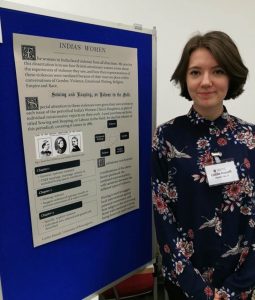Choosing my dissertation topic and focus came surprisingly easily to me, I continued with one of the topics I had found fascinating and been assessed on in first year: empire, from the Making of the Contemporary World core module. I wanted to involve gender with empire in my dissertation, and so my supervisor Manu Sehgal recommended the Cadbury Research Library archive here on campus, which houses the Church Missionary Society Journals, particularly one written by, for and about women in England and India.
Manu was also incredibly helpful in providing starting points for secondary readings which grounded my study within the interdisciplinary fields it bridged. I gathered my notes from these readings, mostly direct quotes with page references, into one lengthy document, and organised them by theme. This was to help me with assessment for the second year Research Methods module, but it has been infinitely useful for the writing of my dissertation, as all my secondary literature notes are together and completely searchable.
I faced a lot of decisions during the research process which I did not necessarily feel equipped to make, and it was scary. I restricted my focus on primary sources to just the first volume of issues of the journal, instead of the first ten volumes as I had planned. I worried I would be judged for taking the ‘easy way out’ to give myself less reading to do, but I knew that ten volumes would have been a ridiculous number of pages. After summer when I met with my supervisor he was pleased with my decisions and told me to trust my research instincts, and throughout the process of creating my dissertation, I have certainly strengthened those instincts, though they were put to the test many times — particularly when, after having written half of the word count for my dissertation, I decided the structure was not working, and so chose to completely rewrite the whole thing, not salvaging a single sentence from my original version.
I had been extremely dissatisfied with limitations I found in my argument. Eight weeks before the official submission deadline, while I was presenting my own poster at the dissertation poster showcase, I realised I no longer agreed with about half the content of my poster. This challenged me. I was by that time aware that I was unhappy with the way my dissertation was forming in the write up, but it was the poster event that made me confront this unhappiness and find a solution.

A long weekend of fret and troubles followed, with self-doubt at an all-time high, and then my eureka moment came in a few thoughts in quick succession: it was not working because of my structure; I was not enjoying writing it because my structure was not letting me say what the sources said; I was forcing an argument onto the sources, instead of analysing what they were telling me; and it was specifically the way in which I divided the chapter schemes that was my downfall, forcing me to act in this way. So, I changed my mind. I sent my supervisor an email justifying my decision, then started writing again from scratch, with a better structure, and I have been able to write my ideas and analysis with renewed enjoyment.
I expect to submit a dissertation about ‘missionary women’s representations of Indian women in 1881’ that I am genuinely pleased with. It has been the best decision I could have possibly made in the circumstances. I have greater trust in myself as an historian and in my capability as a person, and I am so much happier with my dissertation now. I hope my experience will encourage other students that the dissertation process is a long and unpredictable thing, and that projects do not always end up the way we plan but that that’s okay — it helps us grow as historians and as individuals.
Caitlin Russell, BA History
